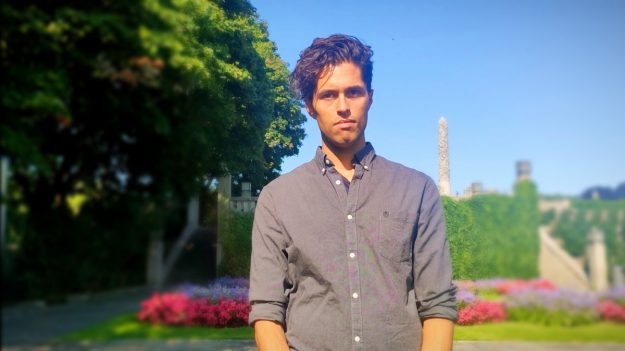Life moves on, a new term has started and we as a division are very glad to welcome our new PhD-student Erik Ljungberg, who works in the History of Media and Environment with a focus on AI and autonomous systems. We have asked him a few questions to introduce himself and you can read his answers below.

Given that you had to switch countries for your new position, how was your transition to KTH?
I have to say that KTH has made the transition very easy. With the opportunity to get an apartment within a short space of time through KTH Relocation, making the jump from Oslo to Stockholm has been pretty effortless. Although shifting COVID restrictions have made the process a little unpredictable at times.
Could you please tell us a bit about yourself and the topics you are working on, especially within your PhD?
I am a historian of knowledge and started at KTH as a PhD student in August. I am more or less associated with the Mediated Planet project, which looks at how data gathering practices, data access and data ownership shape environmental perception and politics. Though my project is also a bit freer to go in different, but related directions. I have backgrounds in both history of knowledge, which was the discipline I wrote my M.A. thesis in at the University of Oslo, and cultural anthropology, which I did a second B.A. in while doing my masters. Specifically my M.A. thesis looked at the advent of phenology, or in other words the measurement of rhythms of nature, in British natural science in the 18th-century. Phenology is a fascinating endeavor to study from a history of knowledge perspective because the possibility of mapping seasonal variations among plants and animals only really came into being once there was a knowledge infrastructure capable of gathering and processing big amounts of data. Basically you had to make daily observations over several years. Particular ways of handling paper were really at the center of this process. But you also needed ways to structure the recorded data in purely visual terms in order to streamline the process of recording and reading data. So one of the things I highlighted in my research was the importance of the table as the condition of possibility for this kind of knowledge production, stressing the fact that knowledge is simultaneously material and cognitive.
My PhD project will maintain this media theoretical focus on how knowledge emerges through being circulated through socio-material infrastructures, but focuses instead on the role of AI and autonomous systems in environmental understanding. It is exceedingly likely that AI and autonomous systems will fundamentally change the way that human society monitors, models, and manages the Earth’s natural systems. What is interesting to me is placing this development within a longer history of shifting Earth-human relationships wherein mediation plays a crucial role. As the environment becomes increasingly dataified, a central question also revolves around usage and access to data. This becomes especially salient once the issue of monetization comes into the picture. Who should capitalize on the use of data that is public, free, and ubiquitous? Questions such as these are important to address as big tech companies currently stand a fair chance of developing a hegemony of expertise when it comes to these issues.
What is coming up right now? What do you aim for in the near future in terms of research, (side-)projects, or public outreach?
Right now I am making an outline of my project, and also simply trying to get an overview of the field, or several fields actually, that I will be working in. Otherwise, I have a couple of things on the agenda. I am working on a paper for the Nordical Journal for Eighteenth-Century Studies, and I had a paper accepted for one of the panels at the upcoming 4S conference. Also, I hope to have a blog up and running in the next months which can serve as a kind of outlet for some of the developments that are unfolding so rapidly within the field of AI and the environment.
Starting during the pandemic is challenging, although we all hope that regular work routines can be resumed during this term. What kind of impact has Covid-19 had on your work?
Actually I got a scholarship to go to London and spend time in the archives, but that proved unfeasable during the pandemic. Certainly my M.A. thesis suffered from this. On the other hand, since a lot of workshops and conferences have gone digital, it has been possible for me to take part in discussions that I never would have been able to if I had to fly. Hopefully the landscape of post-COVID academia will include a lot less flying, while still acknowledging our need to interact face-to-face.
*
Thank you, and “Välkommen!” Erik, it is good to have you with us!

